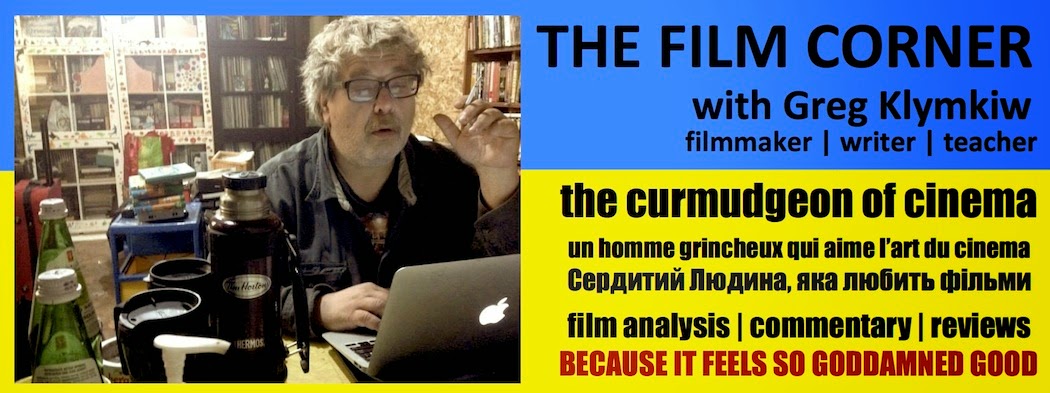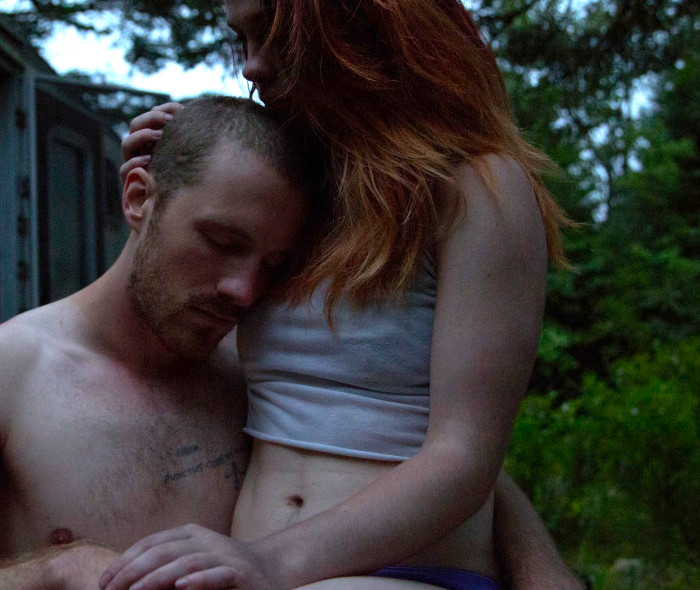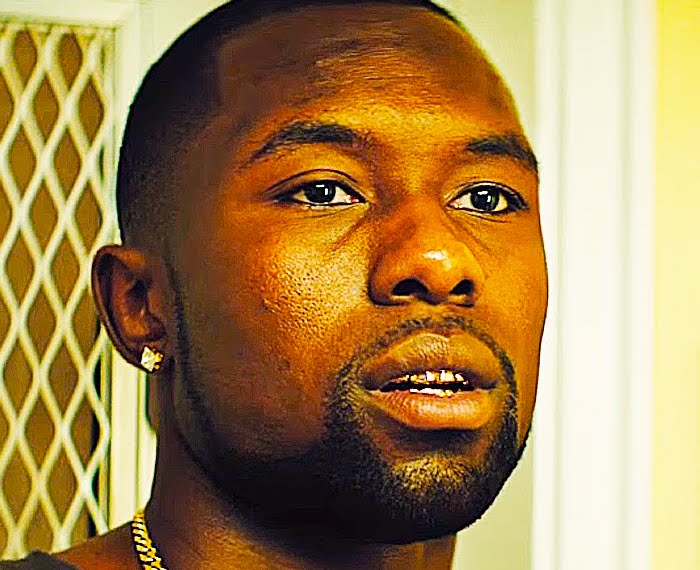 |
| Stalker (left), Prey (right). Two of the scariest, creepiest scenes in movie history. And there are more. Plenty more. |
Dir. Jacques Tourneur
Prd. Val Lewton
Scr. DeWitt Bodeen
Starring: Simone Simon, Kent Smith, Jane Randolph, Tom Conway, Jack Holt
Review By Greg Klymkiw
"Mоја сестра." ("My Sister.") - greeting from a woman afflicted with the old Serbian curse of turning into a cat when she gets horny to another woman similarly afflicted in Val Lewton's Cat People.There aren't too many stories as sexy, haunting and downright terrifying as this one. Based on Val Lewton's short story "The Bagheeta", Irena Dubrovna (Simone Simon) an émigré from Serbia in modern day Manhattan refuses to have sex with the handsomely hunky square-jawed husband she loves (the somewhat presciently monikered "Oliver Reed", played by Kent Smith) because she's terrified she'll turn into a ravenously deadly black panther. When the frustrated hubby turns his amorous attentions to Alice Reed (Jane Randolph), his beautiful co-worker at the engineering firm he's employed by, it's quite possible that claws will sprout and fangs will be bared.
As a genre, the horror movie came of age with the visionary Val Lewton's 1942 RKO shocker Cat People and there is not a single scary picture that followed that doesn't owe it a huge debt of gratitude.
For example, how many times have you watched a horror film and jumped out of your seat, clutching your heart, grasping your breath, (and possibly) unloading a stream of urine and/or a glob (or three) of faecal matter in your drawers when a wham-bam shock-cut batters you senseless? Chances are, in good movies or bad, the jump-scare has knocked you on your tailbone (or preferably your cushy derriere) more times than you'd care to admit to yourself, much less anyone else.
Well, you saw it here first, folks - Cat People invented the jump-scare.
The scene in which it occurs here was so shocking, so stunning and so memorable that for decades afterwards, when film crews were setting up for shots involving a jump-scare, they'd refer to it as setting up for "The Bus". Yes, they were referring to the "bus" in Cat People. There's no need to spoil it for you.
When the bus arrives, you'll know it!
"The Bus" is important for more than introducing the jump-scare (as we now know it) to the world; it's everything that precedes the shock (in both the sequence and the film itself) and everything that follows.
Prior to Cat People, the horror film was primarily rooted in the "past" - historical narrative rumination upon long-ago-far-away worlds of Bürgermeisters, torch-carrying villagers and monsters created via alchemy. Not that there is, or was anything wrong with this, but when the highly regarded writer and story editor Val Lewton was hired by the ailing RKO studios to set-up a horror movie division, he had his work cut out for him. The studio was, at this point, almost bankrupted by the WWII (and post-war) economy, but also by Orson Welles via the disappointing box-office of Citizen Kane and the wild cost-overruns of The Magnificent Ambersons. They wanted horror movies! They needed to be made fast and cheap!
Lewton was the right man for the job. Long associated with madman creative genius David O. Selznick, he learned well from the best in the business, but he also had his own ideas about things. One time Selznick so infuriated Lewton that the young man wrote, uncredited of course, a scene in Gone With The Wind that was so insanely over-the-top that he assumed Selznick would never consider including it in the movie.
Remember Scarlett O'Hara stumbling onto the Main Street of Atlanta, the dirty roads cluttered with the hundreds upon hundreds of wounded soldiers, the camera pulling away from her and craning up to a God's-eye view as a tattered Confederate flag flapped in the wind? Lewton wrote this. Selznick shot it. The scene might be one of the most famous in movie history. Well, when Selznick, in a shockingly magnanimous gesture, recommended Lewton to RKO, movie history was not only made again, but cinematic storytelling took a decidedly welcome turn.
The Ukrainian-born Lewton (his Aunt was Alla Nazimova) was steeped in a tradition of literature and folklore. He also brought a lonely childhood to bear upon his subsequent work which fuelled his imagination.
Lewton believed that what was scary - REALLY scary - was everything in the real and CONTEMPORARY world that "normal" people had to face. Blending this with his love for fairy tales and folklore, Lewton was the first person to bring horror to the "modern" world.
With Cat People, here was a story about a stranger in (to her) a strange new land - a woman from an "old" world in a "new" world, carrying the baggage and sins of her ancestors into an America which valued prosperity and forward-thinking. It's a story about marital strife, sexual frustration, loneliness, suicidal despair, psychoanalysis, the complex relationships between men and women and most of all, the scariest thing of all - the dark.
Yes, darkness. What we can't see is what scares all of us.
Lewton understood this and decided to exploit it for all its worth. Though rival Universal Pictures made a fortune from horror movies, they already had long-standing franchises (Frankenstein, The Wolf Man, The Mummy and Dracula) to keep the bucks rolling in for a modest cost. All RKO had was the King Kong franchise, but they really couldn't be made fast and cheap. The studio's marketing geniuses handed Lewton a whole whack of titles. Yes, titles only. These titles were "proven" potential for box office gold as exhibitors had been polled and gave big collective approval ratings to them.
 |
| Lurid promises - A movies that delivers the goods. |
So, for his first production, Lewton was handed the title Cat People. Oh, he did not disappoint. Working from Lewton's original short story, screenwriter DeWitt Bodeen, director Jacques Tourneur, cinematographer Nicholas Musaraca and editor Mark Robson not only delivered one of the most dazzlingly original horror pictures ever made up to that point (and let's not forget that the likes of James Whale and Tod Browning were no previous slouches in this department), but generated a film that went through the roof at the box office. (Lewton also brilliantly presided over all the studio's lurid marketing materials.)
The horror set-pieces are still unparalleled in terms of their influence upon cinema. Lewton and his team used darkness to their clear advantage - deep shadows and off-screen horror-potential keep us shivering (and practically, they don't cost money). Add to this, though, the astonishing use of sound design. Who will ever forget the creepy water sounds and echoes in the film's empty swimming pool at night sequence? Or how about the two sets of click-clicks of high heels upon the sidewalk pavement in Central Park as a woman senses being stalked?
And then, there's "The Bus".
Goddamn, it's scary. As is the whole movie.
THE FILM CORNER RATING: ***** Five Stars
The Cat People is now on Criterion Blu-Ray and (if you must) DVD. The sumptuous package includes a new 2K digital restoration, with uncompressed monaural soundtrack on the Blu-ray, a 2005 audio commentary with film historian Gregory Mank and excerpts from an audio interview with Simone Simon, a 2008 feature-length documentary: "Val Lewton: The Man in the Shadows", a 1979 interview with Jacques Tourneur, a trailer and an essay by critic Geoffrey O’Brien.






























